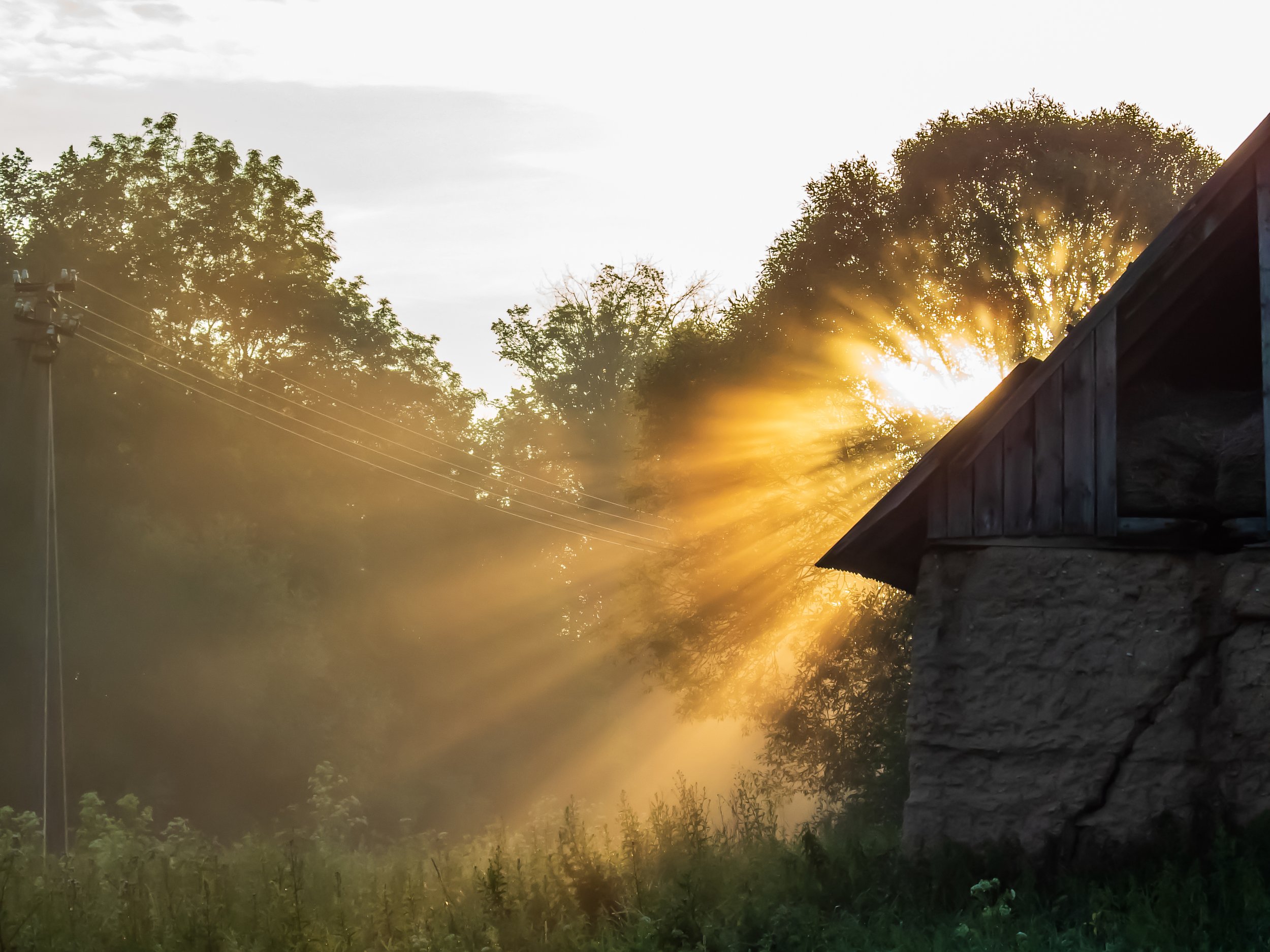Mornings in My Garden
By Jane Delury
Every morning in spring and summer, I start my day the same way. While the house still sleeps, alarms not yet beeping, my email unread, I pour a cup of coffee and feed the cat. Then I step out of my slippers and into my clogs and go outside to my small garden. The sky is restful, and the clouds are usually hiding. A pair of doves sit on a telephone wire like notes on a piano staff. Robins chirp in the dogwood tree. Over the grass, I walk from raised bed to container, sometimes in the rain, looking to see what has changed since last night. There, a pea vine has broken into flowers. A columbine has flounced open. The strawberry tucked under a fan of mint leaves has plumped and is ready to eat. I pick it, wipe off the dirt and pop it into my mouth.
This daily walk doesn’t take long, because the footprint of my garden is tiny—a strip of backyard with a patch of grass and a concrete parking pad, crisscrossed by electric lines that lead to my house and the adjoining townhomes of my neighbors. Not quite suburban, not quite urban, our homes were built in the 1930s, when Baltimore began to sprawl. A block away, a busy street hums with traffic even at an early hour. When I first moved to this house after my divorce, I found the backyard bleak. But now it’s one of my favorite places, my stomping ground and experimental laboratory, a chaotic, ever-changing sanctuary. Over the years, I’ve accumulated a hodgepodge collection of containers, cedar planters, and terra cotta pots to cover the parking pad. Along one fence is a more formal bed, and as I do my morning walk in April, the hostas under the dogwood tree rise like lime green fins in the mulch. Forget-me-nots form an unexpected river along the side of the AC unit. Tender wisteria shoots start to climb from their woody winter refuge.
Every day, something has shifted, something has started. By July, my morning walk takes me past a jungle of heirloom tomatoes, zucchini, Black-eyed Susan vine, cucumbers, passionfruit flowers, bee balm, mint, basil, thyme, watermelon, raspberries. There are scarlet runner beans twirling up the posts of the porch, often haunted by a hummingbird. Everything is magnified and slower in the morning. Colors pop and angles sharpen.
I’m a busy person, and more importantly, my mind is always busy: worrying, projecting, strategizing, interpreting. I try to address this in the ways that I’m advised: meditation, exercise, and medication. But a morning walk around my garden is the one daily practice with a singular power to invite stillness, sharpen my observations, and teach me how to walk through life.
Sometimes what I see doesn’t please me. This May, a marauder squirrel plowed through my lettuce planter three times, uprooting the same beleaguered chive plant, questing for something in the soil that I doubt he found. When I reached that planter, my impulse was to yell. But I save my yelling for later in the day, when, seeing the squirrel, I’ll pound on the window and run outside. Not in the morning. In the morning, I note the devastation then move on to the poppies that have bloomed or the pole beans cracking into shoots. I pass a dying vine on a zucchini plant, a watermelon leaf shriveling with powdery mildew. I walk by my own mistakes in spacing and design that come to light as the plants grow—a coneflower starting to shade a sun-starved lupine, a clematis pruned too hard.
In these first minutes of my day, outside in my garden, I don’t act. I don’t do. I don’t grab the clippers or a spade. I don’t train the honeysuckle vine that has flopped onto the eggplant. I accept the losses. I forgive my gardening failures. I forgive the squirrel. Mornings go by, and years go by, and I keep waking up with my garden, practicing, learning the language of my plants, and the language of life.
Soon enough, I’ll be back inside, scraping together a school lunch, hollering up the stairs, reading the newspaper on my phone, checking feeds, and answering messages. But I try to hold on to the lesson. And sometimes, in the middle of the day, overstressed and overwhelmed, I walk outside to take a breath, eat a pea, pick a flower, and reconnect to stillness.
Jane Delury is the author of The Balcony, a novel-in-stories, which won the Sue Kaufman Prize for First Fiction from the American Academy of Arts and Letters. Her new novel, Hedge, is out now with Zibby Books. Her short stories have appeared in Granta, The Sewanee Review, The Southern Review, The Yale Review, Glimmer Train, Narrative, and other publications. Her awards include a PEN/O. Henry Prize, a Pushcart Special Mention, and grants from the Maryland State Arts Council. Her essays have appeared in Real Simple, Oprah.com, LitHub, and Poets and Writers. She holds a BA in English and French literature from UC Santa Cruz, a maîtrise from the University of Grenoble, and an MA from the Johns Hopkins Writing Seminars. A professor at the University of Baltimore, she teaches in the MFA in Creative Writing & Publishing Arts and directs the BA in English. She lives in Baltimore with her daughters and her partner, the writer Don Lee.


